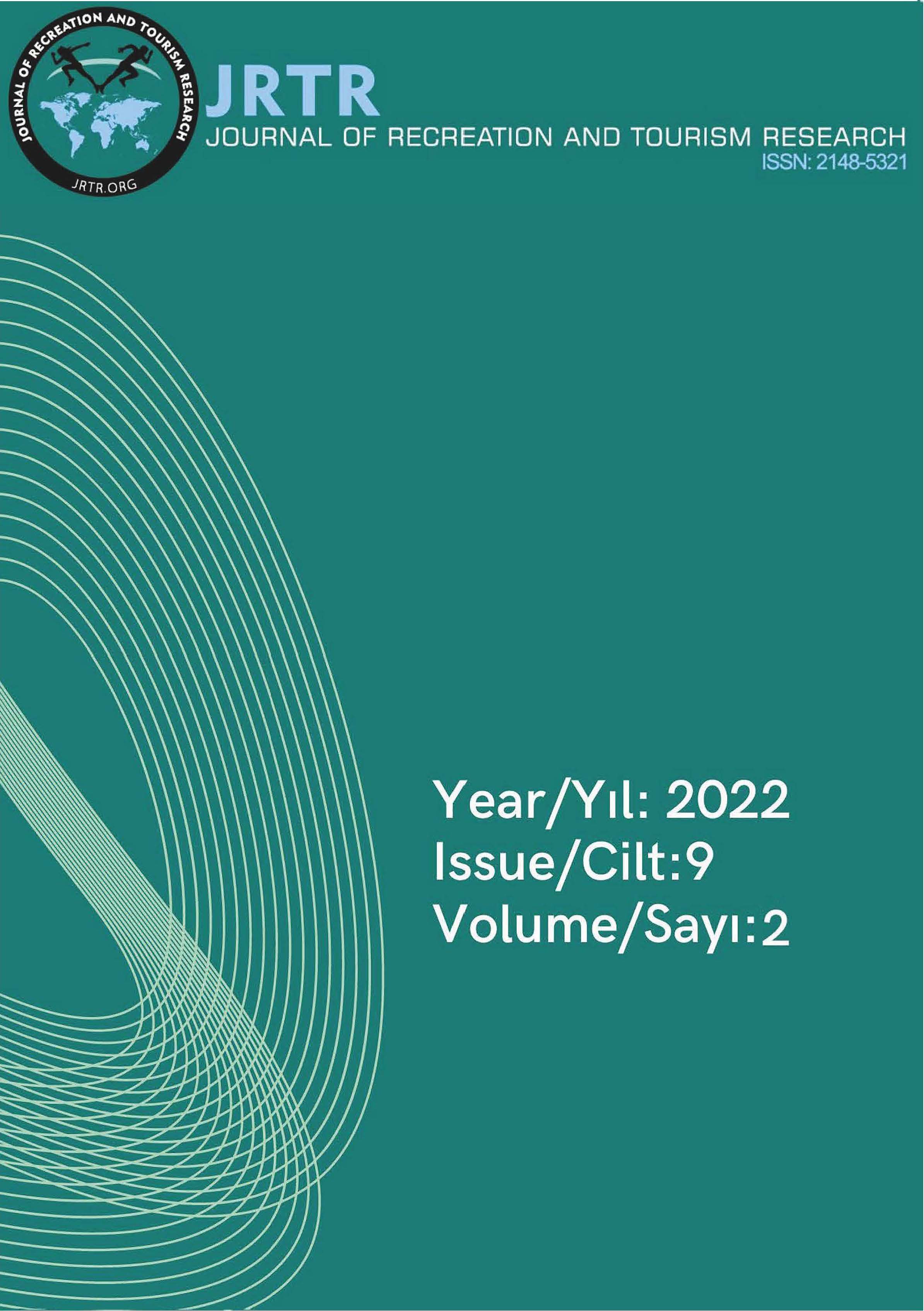What Attracts Tourists on Social Media? A Semiotic Analysis on Turkey-Greece Destinations
DOI:
https://doi.org/10.5281/zenodo.6774375Keywords:
Social Media, Instagram, Promotion, Semiotics, Turkey, GreeceAbstract
Destination promotion, in general terms, refers to the transfer of touristic products and services of the destination created for the tourists determined as the target audience, through channels using visual and auditory materials. Among the purposes of touristic promotion are to position the core values and capabilities of the destination in question by creating a positive image in the minds of tourists by executing various marketing strategies, to activate travel motivations through the senses, to increase sales volume, to increase the attractiveness of destinations and to disseminate existing information about products and services. can be sorted. In this context, the subject of the research is the interpretation of the images related to the promotion in the state-supported social media accounts (Instagram) of the destinations. From this point of view, the aim of the research is to analyze and make sense of the first two images, which are the most liked for each destination, among the images in the state-supported official social media accounts of Turkey and Greece in the Mediterranean basin. This research reveals what the users, who can be considered as potential tourists, who follow Turkey and Greece as touristic destinations on Instagram, pay attention to what they pay attention to in the images, after the promotional activities are carried out in digital environments in accordance with the post-modern age. The study is considered important in terms of contributing to more effective promotional activities for the next promotional materials by analyzing the meanings of the most liked images and contributing to stand out from competing destinations in terms of promotion on Instagram. According to the results of the findings obtained from the research, it is interpreted that the promotions made through the visuals of the destinations through social media are effective on individuals.
Downloads
References
Altınbüken, B. (2014). Göstergebilim Yöntemiyle Görsel Sözce Çözümlemesi. İçinde A. Güneş (Ed.), İletişim Araştırmalarında Göstergebilim, Liteartürk Academia, Konya.
Ardıç Yetiş, Ş. (2020). Azerbaycan Turizm Tanıtım Filminin Göstergebilimsel Analiz Yöntemi ile İncelenmesi, MTCON'20 Kıtalararası Turizm Yönetimi Konferansı’nda sunuldu, Ankara-Türkiye, 1878-1879.
Aslan, E. (2021). Instagram İstatistikleri 2021-Önemli Gelişmeler. https://teknobur.com/instagram-istatistikleri Son Erişim Tarihi : 12/11/2021.
Bahar, O. ve Kozak, M. (2005). Türkiye Turizminin Akdeniz Ülkeleri ile Rekabet Gücü Açısından Karşılaştırılması. Anatolia: Turizm Araştırmaları Dergisi, 16(2), 139-152.
Barthes, R. (2016). Göstergebilimsel Serüven. Yapı Kredi Yayınları, İstanbul.
Chomsky, N. (2002). “Dil ve Zihin”. (Çev: Ahmet Kocaman), Ayraç Yayınevi, Ankara.
Civelek, M. ve Türkay, O. (2020). Göstergebilimin Kuramsal Açıdan İncelenmesine Yönelik Bir Araştırma. Alanya Akademik Bakış, 4(3), 771-787.
Çağlar, B. (2012). Bir İletişim Biçimi Olarak Gösterge Bilim, EUL Journal of Social Sciences, LAÜ (Lefke Avrupa Üniversitesi) Sosyal Bilimler Dergisi, 3(2), 22-34.
Denkel, A. (2003). Nesne ve Doğası, Doruk Yayınevi, İstanbul
Digital 2021 Us. (2021). https://wearesocial.com/us/blog/2021/01/digital-2021-us/ (Erişim Tarihi: 15/12/2021).
Duran, G. (2021). Türkiye'deki Unesco Gastronomi Şehirlerinin İçerik Analizi ile Kimliklerinin Keşfedilmesi. Yüksek Lisans Tezi. Ankara Hacı Bayram Veli Üniversitesi Lisansüstü Enstitüsü, Ankara-Türkiye.
Erdem,D. (2020). Turizm Tüketicilerinin Sosyal Paylaşım Sitelerine Yönelik Algılarının Otel Seçimi ile İlişkisi. Yüksek Lisans Tezi. Ankara Hacı Bayram Veli Üniversitesi Lisansüstü Eğitim Enstitüsü, Ankara-Türkiye.
Erdem, D. ve Hassan, A. (2021). Turizm Tüketicilerinin Sosyal Paylaşım Siteleri ile Otel Seçimleri Arasındaki İlişkiye Yönelik Ampirik Bir Çalışma. IBAD Sosyal Bilimler Dergisi, (11), 1-18.
Erkman, F. (1986). Göstergebilime Giriş. Alan Yayıncılık, İstanbul.
Eryılmaz, B., Zengin, B. (2014). Butik Otel İşletmelerinin Sosyal Medya Kullanımına Yönelik Bir İnceleme: Facebook Örneği. Kastamonu Üniversitesi İktisadi ve İdari Bilimler Fakültesi Dergisi, 4, 42-59.
goturkiye. (2021). https://www.instagram.com/goturkiye/ (Erişim Tarihi: 20.11.2021).
Guiraud, P. (1994). “Göstergebilim”. (Çev: Prof. Dr. Mehmet Yalçın), İmge Kitabevi, Ankara.
Guiraud, P. (1999). Anlambilim. Multilingual, İstanbul.
Güler, P. (2021). Mülteci Kamp Fotoğraflarının Oryantalist Söylem Bağlamında Görsel, Sosyal ve Göstergebilimsel Açıdan İncelenmesi. Doktora Tezi, Maltepe Üniversitesi Lisansüstü Eğitim Enstitüsü, İstanbul.
Günay, V.D. (2008). Görsel Okuryazarlık ve İmgenin Anlamlandırılması. Süleyman Demirel Üniversitesi Güzel Sanatlar Fakültesi Hakemli Dergisi, 2008(1), 1-29.
Öztürk, G., ve Öncüer Çivici, M. E. (2018). Küyerelleşme Kapsamında Türkiye Turizm Tanıtım Afişlerinde Somut Olmayan Kültürel Miras Öğelerinin Kullanımı: Bir Gösterge Bilim Analiz Örneği. Journal of Travel and Tourism Research, (13), 69-95.
Parsa, S. ve Parsa, A. F. (2012). Göstergebilim Çözümlemeleri. Ege Üniversitesi Basımevi, İzmir.
Rifat, M. (2005). XX. Yüzyılda Dilbilim ve Göstergebilim Kuramları 1, YKY Yayınları, İstanbul.
Rifat, M. (2019). Göstergebilimin Abc'si, Simavi Yayınları, İstanbul.
Rigotti, E. ve Rocci, A. (2006). Denotation versus Connotation. Encyclopedia of Language & Linguistics (Second Edition), 436-444.
TDK Güncel Türkçe Sözlük. https://sozluk.gov.tr/ (Erişim Tarihi: 15/12/2021).
visitgreceegr. (2021). https://www.instagram.com/visitgreecegr/ (Erişim Tarihi: 22.11.2021).
Yavuz, M.C. ve Karabağ, F.S. (2009). Ulusal Turizm Tanıtımı ve Pazarlama Yönetimi Örgütlenmesi: Türkiye İçin Bir Model Önerisi. İstanbul Üniversitesi İletişim Fakültesi Dergisi, 36(2009), 114-115.
Yıldırım A. (1999). Nitel Araştırma Yöntemlerinin Temel Özellikleri ve Eğitim Araştırmalarındaki Yeri ve Önemi. Eğitim ve Bilim, 23(112), 7-17.
Downloads
Published
How to Cite
Issue
Section
License
Copyright (c) 2022 Journal of Recreation and Tourism Research

This work is licensed under a Creative Commons Attribution-NonCommercial 4.0 International License.






